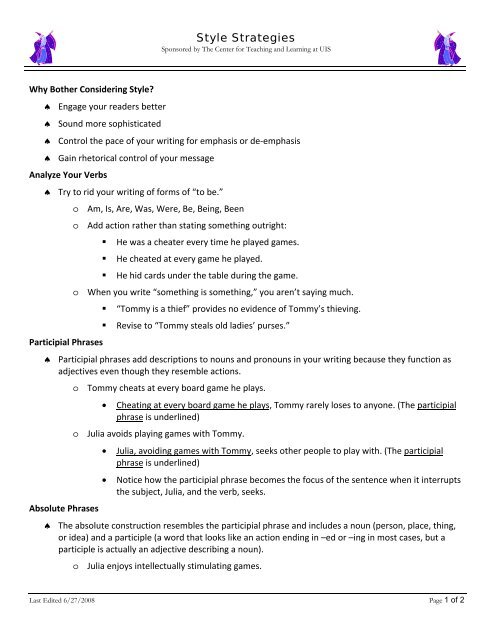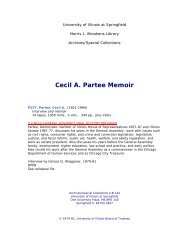Style Strategies
Style Strategies
Style Strategies
You also want an ePaper? Increase the reach of your titles
YUMPU automatically turns print PDFs into web optimized ePapers that Google loves.
Why Bother Considering <strong>Style</strong>?<br />
♠ Engage your readers better<br />
♠ Sound more sophisticated<br />
<strong>Style</strong> <strong>Strategies</strong><br />
Sponsored by The Center for Teaching and Learning at UIS<br />
♠ Control the pace of your writing for emphasis or de‐emphasis<br />
♠ Gain rhetorical control of your message<br />
Analyze Your Verbs<br />
♠ Try to rid your writing of forms of “to be.”<br />
o Am, Is, Are, Was, Were, Be, Being, Been<br />
o Add action rather than stating something outright:<br />
He was a cheater every time he played games.<br />
He cheated at every game he played.<br />
He hid cards under the table during the game.<br />
o When you write “something is something,” you aren’t saying much.<br />
“Tommy is a thief” provides no evidence of Tommy’s thieving.<br />
Revise to “Tommy steals old ladies’ purses.”<br />
Participial Phrases<br />
♠ Participial phrases add descriptions to nouns and pronouns in your writing because they function as<br />
adjectives even though they resemble actions.<br />
o Tommy cheats at every board game he plays.<br />
• Cheating at every board game he plays, Tommy rarely loses to anyone. (The participial<br />
phrase is underlined)<br />
o Julia avoids playing games with Tommy.<br />
• Julia, avoiding games with Tommy, seeks other people to play with. (The participial<br />
phrase is underlined)<br />
• Notice how the participial phrase becomes the focus of the sentence when it interrupts<br />
the subject, Julia, and the verb, seeks.<br />
Absolute Phrases<br />
♠ The absolute construction resembles the participial phrase and includes a noun (person, place, thing,<br />
or idea) and a participle (a word that looks like an action ending in –ed or –ing in most cases, but a<br />
participle is actually an adjective describing a noun).<br />
o Julia enjoys intellectually stimulating games.<br />
Last Edited 6/27/2008 Page 1 of 2
<strong>Style</strong> <strong>Strategies</strong><br />
Sponsored by The Center for Teaching and Learning at UIS<br />
Revise to: Intellect stimulated, Julia finds a partner for playing chess. Or Mind racing,<br />
Julia finds an outlet for her overactive intellect in stimulating games. (The absolute<br />
phrase is underlined)<br />
Appositive Phrases<br />
♠ An appositive phrase adds details to other nouns. The difference between an appositive phrase and a<br />
participial phrase is that an appositive also functions as a noun; therefore, an appositive phrase<br />
frequently begins with “a, an, or the.”<br />
o Tommy still cheats at board games.<br />
• Revise to: Tommy, a cheat at board games, can never find anyone who wants to play<br />
with him anymore. (The appositive phrase is underlined)<br />
o Julia needs an outlet for her over‐stimulated intellect.<br />
• Revise to: An exceptionally bright student, Julia seeks an outlet through board games for<br />
her over‐stimulated intellect. (The appositive phrase is underlined)<br />
Adjectives Shifted Out of Order<br />
♠ Adjectives, the most common form of description for beginning writers, describe nouns and pronouns.<br />
Two other brushstrokes—participial phrases and absolutes—function as adjectives, though in form<br />
they differ. In English, adjectives usually come before nouns; for example, we would most likely write:<br />
The exciting and complicated game made for a fun evening. If we shift the adjectives out of order, we<br />
draw attention to the adjectives and slow the pace of the sentence: The game, exciting and<br />
complicated, made for a fun evening.<br />
o A sharp, apt contender, Julia often wins the games she plays.<br />
• Revise to: Julie, sharp and apt, often wins the games she plays.<br />
Punctuation Alert<br />
♠ Be sure to pay attention to comma usage when employing the brushstrokes.<br />
♠ When using an introductory element, be sure to set it off with a comma.<br />
♠ If you are interrupting a sentence, as adjectives shifted out of order will inherently do, remember to<br />
set off the interruption with commas.<br />
Caution!!!!<br />
♠ As with any technique, overuse can kill the variety you looked for to begin with, so use discretion<br />
when applying your new brushstrokes to your next assignment.<br />
Last Edited 6/27/2008 Page 2 of 2

















